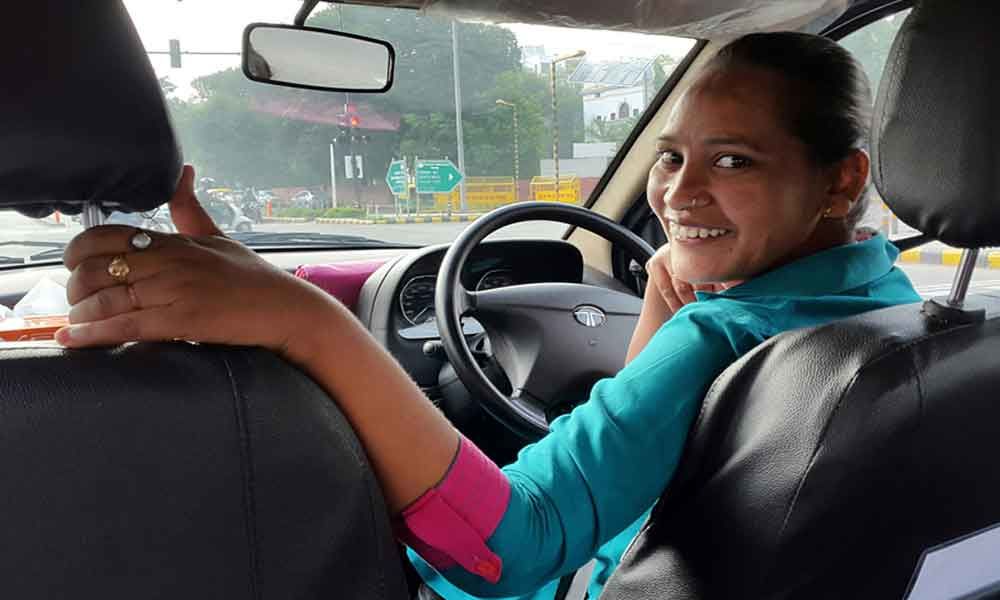Live
- Boxing Day Test Weather Forecast: Rain Delays Expected on Day 3 and Day 4 in Melbourne
- Baby John Twitter Reviews: Varun Dhawan Impresses, but Fans Feel the Remake Lacks Theri's Charm
- Pakistan Air Strikes Kill 46 in Afghanistan, Taliban Confirms Amid Rising Tensions
- ACB Launches Investigation into Formula E Races Held in Hyderabad Last Year
- Mega Job Mela in Madhapur on December 28: Explore Employment Opportunities in Hyderabad
- New Mizoram Guv likely to take charge next week
- Barroz 3D Movie Review: A Visual Treat for Mohanlal Fans, Mixed for Others
- Donate Blood, Save Lives: BJP Hosts Mega Blood Donation Camp in Aiza
- Azerbaijani Airliner Crashes Near Aktau, Kazakhstan: 32 Survive, Over 30 Feared Dead
- Union Minister Bandi Sanjay Kumar to Visit Jogulamba Gadwal District on December 27, 2024
Just In
These female chauffeurs are driving in change in their lives


Lalita, who has worked as a chauffeur and now trains women to drive professionally, learnt to stand on her feet after acquiring a permanent driving license at 18. Ten years on, her story demonstrates how an NGO and a women-oriented cab service have managed to empower women and hit at deep-seated prejudice against female drivers.
New Delhi: Lalita, who has worked as a chauffeur and now trains women to drive professionally, learnt to stand on her feet after acquiring a permanent driving license at 18. Ten years on, her story demonstrates how an NGO and a women-oriented cab service have managed to empower women and hit at deep-seated prejudice against female drivers.
Azad Foundation, a non-profit organisation that trains resource-poor women to take up driving professionally, started this 'Women on Wheels' program in 2008.
For a fee as small as Rs 2,000 -- payable in installments -- for the entire training period of 6-8 months, women from poor communities work at their driving skills and knowledge of road rules at different centres across Delhi.
After mastering the steering wheel, they go on to become private chauffeurs or drivers with Azad's sister organisation Sakha Consulting Wings -- a "for women by women" cab service available on the Sakha helpline on a day's notice. Few have joined global transport company Uber.
Through its workers and volunteers, it mobilises women in different communities to join the programme.
"In the beginning, we sense hesitation but more so from the family, especially fathers and brothers. Then there's an internal struggle, 'Kar bhi paayenge ya nahi?' (Will we be able to do it?) Once they come out of this phase, then it rolls smoothly," Azad's training coordinator Bidyarani Devi told IANS here.
In their north Delhi centre, 28-year-old Lalita is the only female driving instructor out of three. She commutes from Madanpur Khadar, a slum resettlement colony in Delhi's periphery, where she single-handedly supports her parents and younger siblings.
"I worked for NGO projects that helped me finance my education and when the final one ended, they routed me to Azad which had started giving driving training.
"My father didn't take well to my training. He didn't give the initial Rs 2,000, and cut me off when Sakha employed me. My family had taken a house loan worth some lakhs that was difficult to repay. Things went bad, and I stepped in with my little savings," Lalita told IANS.
A financially-empowered Lalita gradually paid off the debt, supported the education needs of her siblings, and financed the treatment of her mentally-ill mother.
While it could have been possible in any other profession as well, she gives credit to Azad and Sakha, who also taught her to steer the wheel of her life.
For many of her students, who range from college-goers to married women, familial support had been just as unsteady.
Is it hard to be a female cabbie in India?
"Certainly. While driving around customers, male drivers would stare at me, some in disbelief and some mockingly. It reminds you that you've entered a traditionally masculine space. But, the reverse is also true. Co-drivers would often cheer me on. I was saluted once," she exclaimed, priding herself on her blue and pink Sakha cab uniform.
Sanjay, another trainer, said that he had held prejudices against women drivers but not anymore.
"When we took our car out, we sometimes said 'How is she driving? She will crash the car'. But now I feel women are indeed good drivers who follow rules," the former private driver said, adding that he urges his male driver friends to follow suit.
Over the years, Azad has enabled more than 1,800 women to become employable.
"There are nearly 750 women engaged as professional chauffeurs, where there were none as of 2008. The women have together provided more than a million safe rides and generated a cumulative revenue of more than Rs 11 crore approximately last year alone," Azad's Programme Director Amrita Gupta said.
Along with driving, the women also participate in sessions about gender, sexuality, law, and communications.
The NGO also helps women acquire learning and permanent licenses in the process of the training. Manisha, a girl from Delhi's working-class Jahangirpuri who will soon sit for her learner's test, dreams of being in the police forces.
"I am from a lower caste, and women are pulled back where I come from. But, I want to learn. I drive a motorcycle and scooty. If I get my car and my police uniform, I have everything," the first-year college student said.
Challenges abound, but for the female drivers of Azad, so does courage and determination.

© 2024 Hyderabad Media House Limited/The Hans India. All rights reserved. Powered by hocalwire.com






